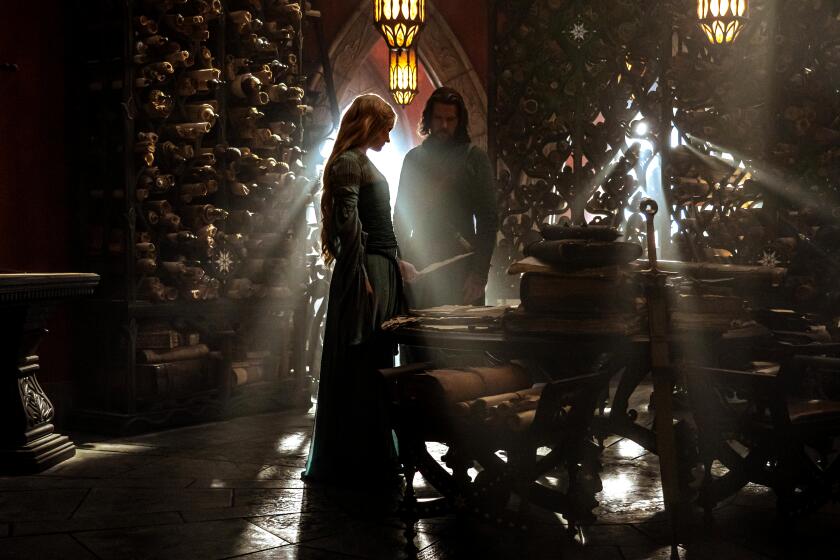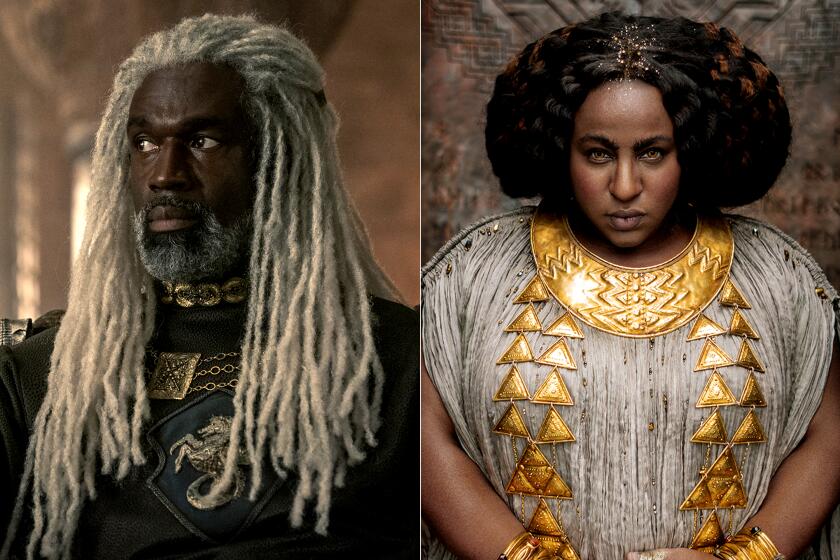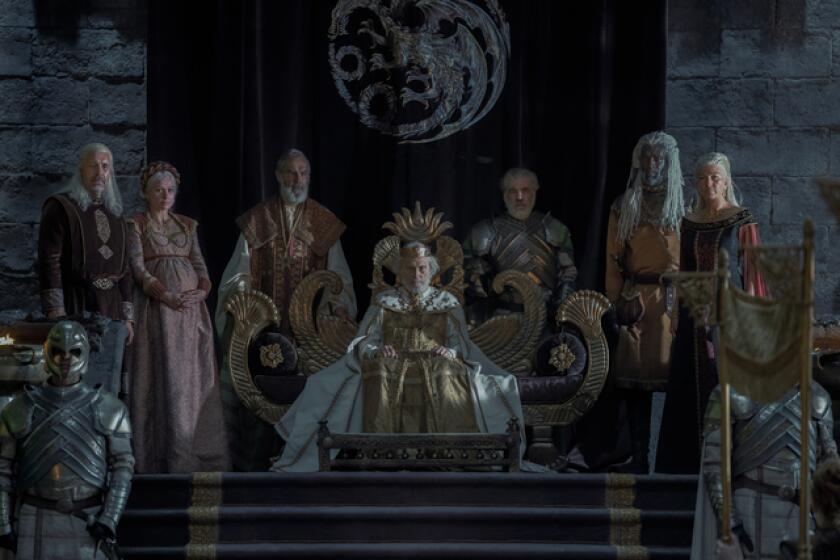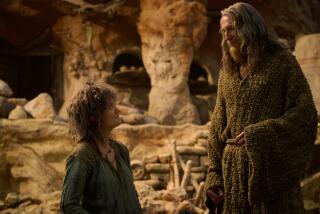Why are TV’s two big fantasy shows so epically humorless?
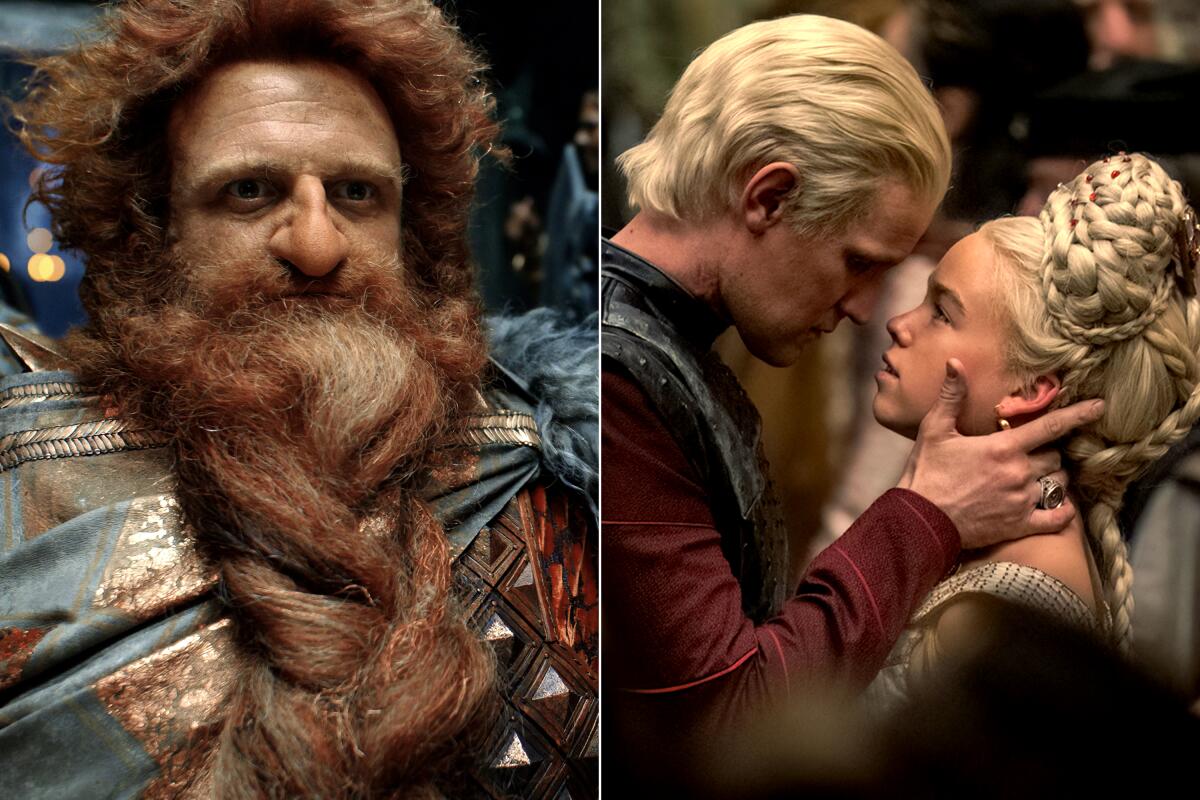
- Share via
By definition, all fantasy epics involve a quest. Season 1 of “Lord of the Rings: The Rings of Power,” which ended last week, revolves around Galadriel’s search for Sauron and, in the finale, sends the Stranger and Nori off on their own adventure. In “House of the Dragon,” which ends on Sunday, all roads, manipulations and desires lead to the Iron Throne, with day trips to hunt Crabfeeders, dragon eggs and, in the penultimate episode, a lost prince.
At some point, however, both of these shows need to tramp around a bit and see if they can locate a sense of humor.
It may not be fair to compare any series with its progenitor, but comparisons are inevitable, and both “Rings of Power” and “House of the Dragon” lack the moments of levity that kept Peter Jackson’s film series “The Lord of the Rings” and HBO’s “Game of Thrones” from becoming mere CG-rrific adventure plods.
Which may be why, though both shows are hits, no one seems to be talking about them that much.
Think of the lines and moments you remember best from “Game of Thrones” and “Lord of the Rings.” Obviously, there are plenty of moving admissions of doubt and declarations of valor. But who can forget the sparring between Legolas and Gimli or the “po-ta-toes” give and take between Sam and Gollum in “Lord of the Rings”? In “Game of Thrones,” everyone’s favorite character was Tyrion (Peter Dinklage), whose world-weary quips and sardonic wisdom sharpened any scene, particularly when played in tandem with the waspish Varys (Conleth Hill).
Column: We bonded over Tolkien when my son was 4. So of course we live-texted ‘Rings of Power’
My son and I have a very deep “Lord of the Rings” bond. We weren’t going to let a few thousand miles keep us from watching the Amazon prequel together.
“Rings of Power” is, tonally and visually, a lighter show than “House of the Dragon,” and it has many more moments of humor, which is to say it has some. The heavy lifting of levity is left almost entirely to the more diminutive characters (make of this what you will). The Harfoots, ancestors of the hobbits, are cheery, delightful and basically Irish, with Poppy (Megan Richards) serving as bossy comedic foil to Markella Kavenagh’s more earnest Nori. Underground, in Moria, Prince Durin IV (Owain Arthur) and his fabulous wife, Disa (Sophia Nomvete), deftly banter and tease each other as well as the half-elf Elrond (Robert Aramayo), who has come to them for aid.
Elrond is the only one of his kind you can imagine being teased. The elves, half or whole, in “Rings of Power” are a stiff-necked bunch, less otherworldly than socially repressed. King Gil-galad (Benjamin Walker) looks like he’s never smiled in his life; Galadriel (Morfydd Clark), though completely kick-ass, spends the whole season so arrogantly wound-up and single-minded in her quest that you want to slip her an edible or something.
I mean, I get that Sauron is the worst and time is of the essence, etc., but you’re in the mythic land of Númenor, for heaven’s sake. Have a glass of wine. Meanwhile, back in Middle-earth, the elf warrior Arondir (Ismael Cruz Córdova) is forced by the plot — and, one assumes, the direction — to live only in shades of “distraught.”
The various humans are not much better: stalking around, arguing about what to do, then standing horrified while bad things happen.
Which pretty much describes the entire first season of “House of the Dragon.” OK, maybe not quite, but it’s not power or blood that unites Houses Targaryen, Hightower and Velaryon: it is epic humorlessness. Only Matt Smith’s Daemon and maybe Eve Best’s Princess Rhaenys (at least in the season’s penultimate episode) seem capable of getting the joke or dropping a bon mot. And Daemon is, thus far, difficult to root for. Not that there’s anything wrong with a witty bad guy, but this show is light on those as well. Poor old Rhys Ifans is given nothing to do but plot diabolically — and morosely — as the king’s hand, Otto Hightower.
My kingdom for Diana Rigg’s Olenna Tyrell.
If you object to characters of color in “House of the Dragon” and “The Rings of Power,” you’re missing the point and revealing your racism.
Every drama, epic or otherwise, requires regular injections of humor, usually through characters whose job, at least superficially, is to comment or bumble into the proceedings. What would “Downton Abbey” have been without the Dowager Countess (Maggie Smith), “Breaking Bad” without Saul Goodman (Bob Odenkirk) or “The Sopranos” without Paulie Walnuts (Tony Sirico)?
This is something Peter Jackson deeply understood when adapting J.R.R. Tolkien’s masterwork. “The Lord of the Rings” is written as a true epic, an alternate mythology that depended as much on archetype and history as on character. The hobbits were always humorous, particularly Sam, and while Legolas and Gimli did have a competitive friendship, Jackson amplified the humor to further humanize the characters and remind the audience what was at stake.
The first seasons of “Rings of Power” and “House of the Dragon” suffer a bit from isolation. Unlike “Game of Thrones,” which began by drawing together the wildly different and geographically separate houses of Stark and Lannister, “House of the Dragon” is essentially a royal court drama. In “Rings,” the various races of Tolkien’s world are, for the most part, kept separate from one another, which precludes the kind of culture-clash humor that often fuels “save the world” dramas. (It’s telling that the bits between Elrond, Durin and Disa are among the series’ high points.)
The comic-relief sidekick is a time-honored way of injecting humor in the darkest hours. But for reasons of their own, the creators of each series did not think to give any of their main characters, with the exception of Nori, a buddy to banter with. Instead, everyone is surrounded either by fellow tight-asses or scheming villains, none of whom have even a dry wit to recommend them.
Even some low-hanging fruit would have helped. Some Tyrion-like quips, perhaps, from put-upon Prince Aemond (Ewan Mitchell). Or some riff on the fact that, for heaven’s sake, there are twins named Arryk and Erryk! Stop taking yourselves so seriously, leaders (and writers) of Westeros!
Whether you’re new to Westeros or making a long-awaited return, here’s everything you need know about the ‘Game of Thrones’ prequel, updated weekly.
Here’s hoping the second season of each series will work more with the power of contrast. Acts of unbroken earnestness, like those of unrelieved wickedness, are dull to watch and boring to talk about. Nothing bonds a character to an audience faster than humor; if you want us to be tense, scared, excited or outraged, you need to let us laugh now and then too.
Both “Rings of Power” and “House of the Dragon” may be big hits, but any series that can roll out eight hourlong episodes without a single memorable one-liner needs to rethink its strategy.
More to Read
The biggest entertainment stories
Get our big stories about Hollywood, film, television, music, arts, culture and more right in your inbox as soon as they publish.
You may occasionally receive promotional content from the Los Angeles Times.

